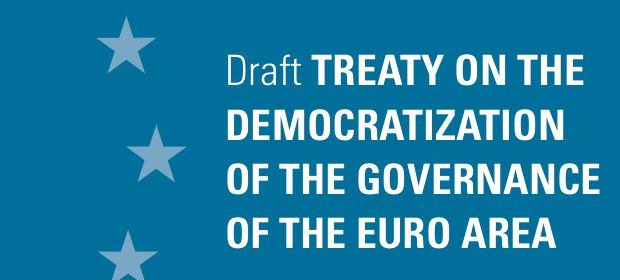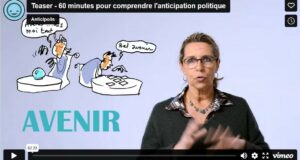Piketty’s “Pour un traité de démocratisation de l’Europe”, which is available in french since March, has just been released in german as „Für ein anderes Europa“ (for a different Europe). The subtitle of the german book clarifies, that the book presents a „Treaty for the Democratisation of the Eurozone“1, a very specific project, which of course should generally advance the democratisation of Europe.
The book of the famous economist is co-authored by a law professor and two political scientists and its core is the presentation of a draft treaty T-Dem (or DemV in german) for the establishment of a Parliamentary Assembly of the Eurozone. To show the legality and feasability of such a treaty the authors argue, that the ESM Treaty, which has been adopted by the Eurozone member states in a situation of emergency and has been found by the European Court of Justice to not violate the committment of these member states to the European Union as such, has created together with the establishment of the Eurogroup a necessary, but intransparent and undemocratic power mechanism, which is in urgent need of democratic control and legitimisation. So with the same urgency and with the same logic, that was approved by the European Court of Justice, a T-Dem should be conceived and implemented very fast to ensure the democratic and proper functioning of the Currency Union.
The draft treaty is not a revolution and Piketty states, that no proposal can cure all problems. It proposes a Eurozone Parliamentary Assembly consisting of 80% parliamentarians of the national parliaments (according to the size of their population) and 20% members of the European Parliament. It does not forsee special Eurozone elections and it does not forsee a change of the european election system towards transnational elections. Piketty and his friends reject a possible change of the European treaties as utterly impossible in the current european political constellation and opt for a pragmatic proposal stating, that such an assembly will contribute to the development of a transeuropean political culture. So the proposal is not as far reaching as the Eurozone-democracy-proposals made by Franck Biancheri and friends and misses its core point of transeuropean elections2, but it is compatible with their assessment, that the establishment of the Eurogroup and the ESM treaty were important, necessary and totally justified, yet undemocratic steps.
Similarly the draft treaty does not establish an Eurozone goverment, that is controlled by a Eurozone parliament, but rather sees the proposed Eurozone Assembly as a first and the Eurogroup as a second chamber and their relation as a mixture of control and cooperation, but with far reaching rights for the new Assembly (always in close cooperation with the Eurogroup): legislative initiative (missing for the EP), right to write legislation for the Eurozone including voting on a Eurozone budget, involvement in the coordination of the budgetary, economic and employment policies of the Eurozone states and the right to vote on key functions (like ECB board, president of the Eurogroup, head of ESF). Basically the Assembly is supposed to be part of all major functions of the Eurogroup including the setting of the agenda of the Eurozone summits and, as its composition shows, should not only closely cooperate with the member states, but also with the EU institutions. It also is open to new members, as they are adopting the Euro (and they are invited as observers before).
It does not say so explicitely, but in my view, the book and the draft suggest, that transnational elections need not only the legitimisation of treaty changes, but even the establishment of European Souvereignty through a European Constitution. As we all know, such a European Constitution did not happen, because it was stopped by popular referenda in seveal member states. This happened 13 years ago and we now see a European (and global) wave towards return to national souvereignty. For me this wave essentially expresses, that only at the level of the current states we have trusted and legitimate constitutions and that people don’t want to risk the garantuee of their rights in these constitutions for a „modern“ re-work of these, fearing that hidden in complicated paragraphs and legal jargon they in the end get a less democratic constitution3. We have the complicated situation, that although the nation states today are the most trusted entities, their age is nearing its end. So Pikettys draft treaty seems an answer for this dilemma and it could be the basis for an European debate (among politics and among the people) that should produce an updated and viable proposal.
This said, I want to shortly illuminate the hidden traps in Pikettys proposal. Although it looks like a mere formal proposal, it contains far-reaching political decisions and goals, so it is not only an organizational, but also a political proposal. And this proposal will not easily reach consensus, especially not, as Piketty himself points out, with German conservatives4. Strong points here could be the proposed Eurozone budget, its finanzing through corporate taxes and a proposed mandate for the Assembly to legislate on the communitarization of national debts (those exceeding 60% of the GDP of a member state)5.
More taxes, more institutions and a presumed incentive for more and unsustainable debts, this is something, that nowadays is opposed by many, not only german conservatives. As I like the proposal as a balanced step forward, I want to give here some lines of arguments, that could modify the proposal. Even if there are many valid reasons for an Eurozone budget, it should be slim, transparent and innovative and demonstrate the will to keep administrative costs at the very minimum. Why not keep the EP in Brussel (as wished by many) and use the Strassburg facilities for the Assembly? What about financing the eurozone budget not through additional taxes but through the ECB? This could be in line with proposals for a monetary reform, that would give the profit of money creation to the state6 and is seen by its advocates as a measure against rising debts. And what about clearly demonstrating in the draft, that a T-Dem would lead not to more institutions, but to more efficiency? So if something is added in the Eurozone, something at the EU level needs to be subtracted, meaning the complicated Eurozone construction should be made more transparent, simpler and cheaper.
Such a process to be successfull would also require national politics to make a leap forward and embrace european issues. Here I see some hope, as the proposed Assembly will de facto give power back to national members of parliament (when they meet in a transnational Assembly) and it therefore requires them to demonstrate, that they are capable of doing this, and to campaign on these issues in national elections7. Given the trend towards new political parties (as in France with Macrons movement) and the transfer of power from the babyboomers to younger politicians, who grew up in the internet age, I am somehow optimistic on this option.
The proposal could however also be modified to include parliamentarians elected through transnational lists. Currently in the European Parliament the introduction of such transnational lists is seriously debated8, so what about establishing, that the EP parlamentarians of the Eurozone Assembly are elected by the European citizens through transnational lists? They could be taken of those MEPs, that are elected through these transnational lists, or they could even be specifically elected for the Eurozone Assembly as part of the next European elections, which would strengthen the democratic legitimisation of the new Eurozone Assembly.
Christel Hahn, Tengen (DE), President of IRPA (Internationaler Rat für Politische Antizipation)
Marie Hélène Caillol, présidente du Réseau Franck Biancheri, a la parole sur les ondes d’EuradioNantesdès 17h
UEF-Belgique interviendra demain sur Radio Vibration, 107.2 à Bruxelles, à 14h15. Ecoutez #UEF et #CitizensRoute73.eu
” data-medium-file=”” data-large-file=”” />The book „Pour un traité de démocratisation de l’Europe“ is written by Thomas Piketty, Stéphanie Hennette, Guillaume Sacriste, Antoine Vauchez. Guillaume Sacriste, co-author of the book took part in the kick-off event of the #CitizensRoute73 in Louvain-la-Neuve on July 1st in the Intellectuals and activists Panel: « Changing Europe, yes! But how? »
1 Treaty draft are availabe online in french and english, and a summary by Piketty can be found here
2 The development of such a transeuropean political culture and transeuropean elections, parties, lists and leaders is the core of the work of Franck Biancheri and the organisations he has founded, see AAFB.
3 This concern is at the core of the strong opposition against TTIP in Europe, more than a decade after the opposition against the proposed European Constitution.
4 When he wrote the proposal he anticipated a victory of Martin Schulz (and a left majority in the new Assembly), whereas now SPD went back to its earlier low numbers and a german government with a conservative orientation is the very likely outcome of the nearing elections.
5 „The Assembly and the Euro Group, acting in accordance with the ordinary legislative procedure, shall adopt the provisions with a view to pool public debts exceeding 60 % of each Euro Area Member State’s GDP.“ – See Piketty
6 See sites like: https://www.sovereignmoney.eu/
7 In the ongoing german elections, eurozone issues have not been campaign on, not even by the ancient EP president Martin Schulz.
8 See EUobserver


 LEAP2040 Toutes les informations et archives Europe2040
LEAP2040 Toutes les informations et archives Europe2040



